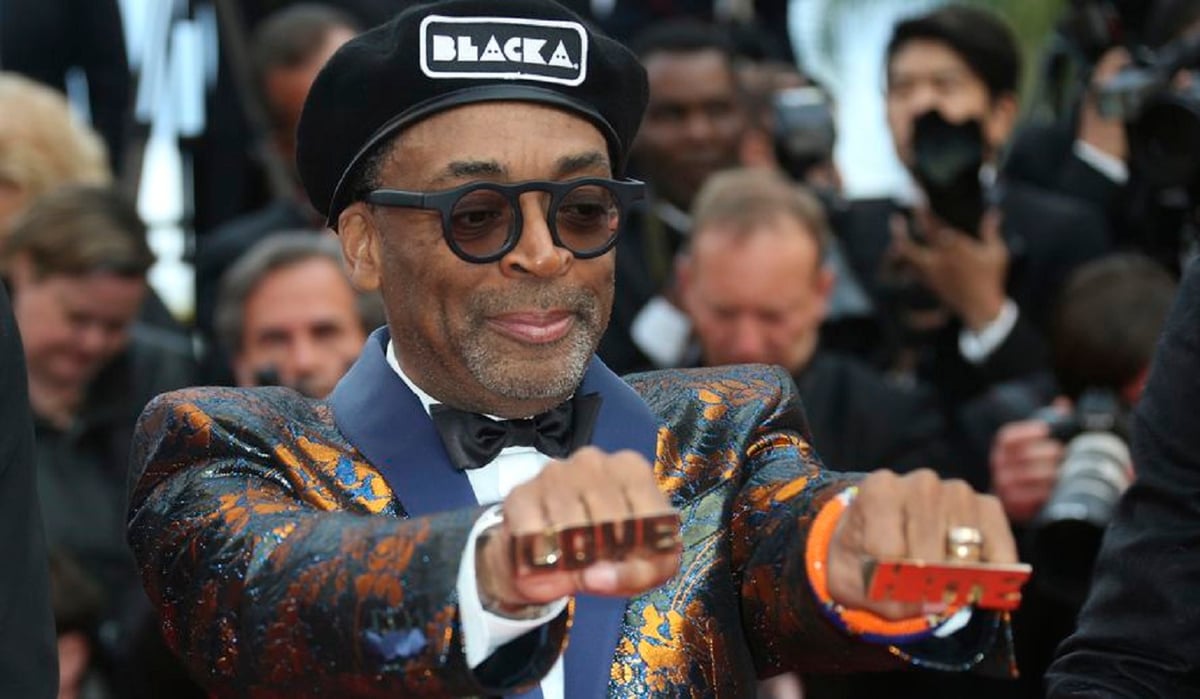Thirty Years of Spike Lee

Spike Lee’s first film, She’s Gotta Have It, came out in 1986, but the writer/director/actor’s best film, the one that made him famous, Do the Right Thing, celebrates its thirtieth anniversary this summer. It’s worth reading contemporary reactions to Lee’s film—Joe Klein’s infamous “Spiked?” is the classic example—if only to see how terrified Lee made people.
Lee’s Q&A in Cannes in 1989 is also required viewing:
Lee still does should-be-shocking things—last year at Cannes, he repeatedly called Donald Trump a “motherfucker”—but the reaction to him is very different. He’s become an elder statesman, part of the fraternity, an academy nominee for Best Director and Best Picture thirty years after his best work got shut out from award consideration.
It’s all about timing. Lee thinks the Academy has come a long way from where it was thirty years ago, but warns against becoming complacent:
“Hollywood has really ramped it up,” he said. “They are making more diverse films. But in order to make sure this is something that is steady and not a trend is for us to see diversity among the gatekeepers, the rarified individuals that decide what we’re making and not making. That’s the only way to ensure against more cyclical droughts, that’s the new frontier. We’ve got a lot of stuff now, but what films are coming out next year? I’m not going to have a film. Who’s going to be there next in the marketplace? The only way to ensure this does not become a trend is that it should be commonplace.”
He used saltier language with the New York Times, but still suggested that the different treatment of his newer film is largely a matter of good timing:
Does any part of you feel like it’s overdue?
I mean, look, it’s no secret. 30 years is a long [expletive] time. But I’m not complaining! It’s a joyous day. I’m blessed for this day. Blessed for the recognition. And there’s a feeling that it’s not just the people that worked on this film [that have earned recognition], it’s the people that have been working on my films since 1986.
You’ve made all kinds of films — some independent, some with studios, some that you wrote, some that were written by others — was there anything about “BlacKkKlansman” that you thought had the potential to resonate in a different way?
Well, when Jordan Peele called me up and gave me the pitch “Black man infiltrates the Ku Klux Klan,” I was intrigued, because with the absurdity of that premise comes humor. Kevin Willmott [a co-writer of the film] and I knew that if we could use the movie to connect the past with the present, we could do something that connected with people. And it was a tough thing to do. But it was successful, and it speaks directly to the world we live in today with this guy in the White House. Today, when 800,000 Americans need a break as we go into another week of this temper tantrum about how this guy wants his money for his wall. A wall he wants to be built upon the border of a country that he says [is home to] rapists, murders and drug dealers. And that they’re gonna pay for! Which is not true.
This film deals directly with the madness and the mayhem of this Looney Tunes, cuckoo for Cocoa Puffs world [laughs]. And I feel that many years to come, when historians search for a piece of art that clearly shows what is happening today, “BlacKkKlansman” will be one of the first things they look at. Because this film is on the right side of history.
But if you really want to use Do the Right Thing to understand contemporary film, the best example is this magisterial essay by Wesley Morris, “Why Do the Oscars Keep Falling for Racial Reconciliation Fantasies?”
From Driving Miss Daisy (which won the Best Picture Oscar the year Do the Right Thing wasn’t nominated) to the past year’s Green Book, pictures about race the Academy loves tend to have a common structure, where racism is somehow not enabled by capitalism (and vice versa) but abated by it:
The white characters — the biological ones and somebody supposedly not black enough, like fictional Don — are lonely people in these pay-a-pal movies. The money is ostensibly for legitimate assistance, but it also seems to paper over all that’s potentially fraught about race. The relationship is entirely conscripted as service and bound by capitalism and the fantastically presumptive leap is, The money doesn’t matter because I like working for you. And if you’re the racist in the relationship: I can’t be horrible because we’re friends now. That’s why the hug Sandra Bullock gives Yomi Perry, the actor playing her maid, Maria, at the end of “Crash,” remains the single most disturbing gesture of its kind. It’s not friendship. Friendship is mutual. That hug is cannibalism.
Do the Right Thing blows up that structure, which is why it was so threatening:
Closure is impossible because the blood is too bad, too historically American. Lee had conjured a social environment that’s the opposite of what “The Upside,” “Green Book,” and “Driving Miss Daisy” believe. In one of the very last scenes, after Sal’s place is destroyed, Mookie still demands to be paid. To this day, Sal’s tossing balled-up bills at Mookie, one by one, shocks me. He’s mortally offended. Mookie’s unmoved. They’re at a harsh, anti-romantic impasse. We’d all been reared on racial-reconciliation fantasies. Why can’t Mookie and Sal be friends? The answer’s too long and too raw. Sal can pay Mookie to deliver pizzas ‘til kingdom come. But he could never pay him enough to be his friend.





Stay Connected